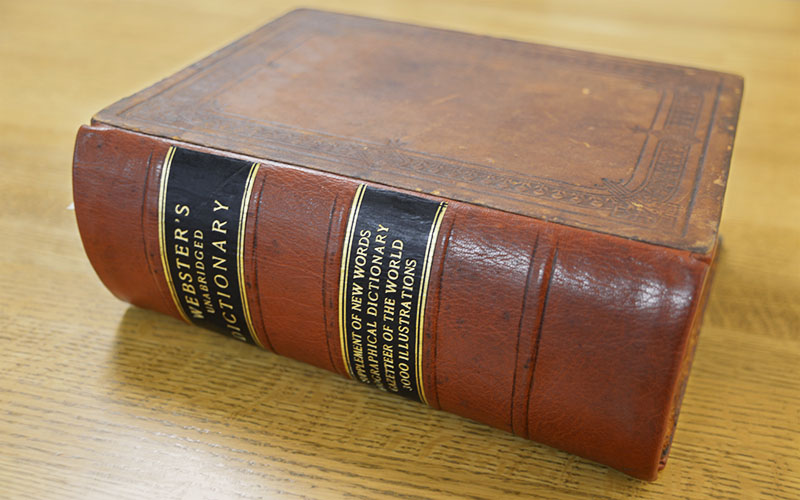What dictionaries did Mary Baker Eddy own?

Not enough documentation exists for us to create a list of all the dictionaries Eddy owned through the many years of her long life. However, when she died in 1910, hundreds of books remained in her Chestnut Hill home. Today these books are included in two Library collections, the Mary Baker Eddy Book Collection and the Chestnut Hill Book Collection. Below is a list of reference works from those collections:
English language dictionaries:
-
The Century Dictionary and Cyclopedia. 10 vols. Edited by William D. Whitney. New York: The Century, 1906. [0.1276]
-
A Comprehensive Dictionary of the English Language. Boston: Swan, Brewer, and Tileson, 1861. [B00333]
-
A Concise Webster’s Dictionary. Edited by D. T. Stuart. New York: A. L. Burt, 1895. [B00316]
-
The Encyclopaedic Dictionary. 4 vols. Edited by Robert Hunter. Philadelphia: Syndicate, 1894. [0.1436]
-
Smith, Benjamin E. The Century Dictionary Supplement. Vols. 11 and 12 of The Century Dictionary and Cyclopedia, edited by William D. Whitney. New York: The Century, 1909. [0.1782]
-
A Standard Dictionary of the English Language. 2 vols. Edited by Isaac K. Funk. New York: Funk & Wagnalls, 1893. [B00295]
-
A Standard Dictionary of the English Language. 2 vols. Edited by Isaac K. Funk. New York: Funk & Wagnalls, 1895. [0.1781]
-
Supplement to A Standard Dictionary of English Language. New York: Funk & Wagnalls, 1904. [0.1428]
-
Webster, Noah, and Chauncey A. Goodrich. American Dictionary of the English Language. Springfield, MA: George and Charles Merriam, 1853. [T1951.0183]
-
Webster, Noah, Chauncey A. Goodrich, and Noah Porter. American Dictionary of the English Language. Springfield, MA: G. & C. Merriam, 1887. [0.1675]
-
Worcester, Joseph E. Worcester’s Academic Dictionary. Philadelphia: J. B. Lippincott, 1888. [B00334]
Multi-language dictionaries:
-
Adler, George J. A German and English Dictionary. Revised by Rank P. Foster and Edward Althaus. New York: D. Appleton, 1903. [0.1435]
-
Beard, John R., and Charles Beard. Cassell’s Latin Dictionary. London: Cassell, n.d. [B00123]
-
Nugent’s French-English English-French Pronouncing Dictionary. 49th edition. New York: Frederick Warne, n.d. [B00253]
-
Roubaud, E. A French and English Dictionary. London: Cassell, n.d. [B00140]
Bible dictionaries:
-
Cruden, Alexander. A Complete Concordance to the Holy Scriptures of the Old and New Testaments or a Dictionary and Alphabetical Index to the Bible. New York: Dodd & Mead, 1871. [B00156]
-
A Dictionary of Christ and the Gospels. 2 vols. Edited by James Hastings, John A. Selbie, and John C. Lambert. New York: Charles Scribner’s Sons, 1907–1908. [0.1379]
-
A Dictionary of the Bible. Edited by William Smith. Hartford, CT: S. S. Scranton, 1867. [B00290]
-
The Holy Bible: Containing the Old and New Testaments. With Nevin’s “New and Improved Dictionary of the Bible.” Philadelphia: John E. Potter, 1872. [B00001]
In her writings, Eddy also referenced other dictionaries that apparently were not in her Chestnut Hill library, including A Dictionary of Science, Literature, and Art. By William Thomas Brande.
The English dictionaries in Eddy’s home represented the best of the time. It is impossible to determine the frequency with which she referred to any particular dictionary, and she never made any statements recommending one volume over another. In December 1897 she gave a Funk and Wagnalls Standard Dictionary to a student, James Neal [L08885]. Pictured among the books on her desk after her passing are Webster’s American Dictionary of the English Language, 1887 edition [0.1675], and Worcester’s Academic Dictionary, 1888 edition [B00334]. A letter to C.H.F. Miller, from 1903, gives some idea of Eddy’s broad use of dictionaries:
In reply to your question, “Would you object to my reading good and God are homonyms?” Yes, I should object to it for good is not like God in sound only but emphatically God in essence quality and quantity. Good possesses the very nature of God. A Christian Scientist can never understand the Principle of divine Science and think otherwise. Christian Science cannot be demonstrated on any other Principle than the absolute unity, oneness of God and good. Webster’s Dictionary and the Century Dictionary confirm my views as to the definition of those two words. The Standard Dictionary defines God as “any person or thing exalted to the chief good” [V00440].
From time to time we are asked if Eddy used a copy of the 1828 first edition of Webster’s American Dictionary of the English Language or The Student’s Reference Dictionary. For more information, see our article Did Eddy use Webster’s 1828 dictionary?

